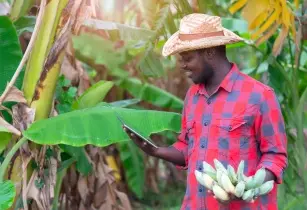In response to concerns like food security and improved nutrition in Africa, the Malabo Montpellier Panel recently unveiled Recipes for Success: Policy Innovations to Transform Africa’s Food Systems and Build Resilience
Launched at the ninth meeting of the Malabo Montpellier Forum on November 23, 2021, the report presents an analysis of over 50 country reports published between 2017 and 2020, offering a roadmap of government action toward better performing and more resilient African food systems.
Current trends suggest that the continent is not on track to achieve Zero Hunger (SDG 2) by 2030. Evidence shows that one in five people in Africa faced hunger in 2020 – more than double the proportion of any other region.
Connecting thematic areas of action
Drawing from seven studies across the thematic areas of nutrition like mechanisation, irrigation, digital agriculture, the energy-agriculture nexus, livestock and agriculture trade, the report highlights how some African countries have achieved sustained progress, providing a practical guide to accelerate efforts toward ending hunger and transforming their food systems.
“There is worrying evidence that the pace of progress in Africa had reduced significantly, even prior to the pandemic, partly due to stagnating public investment in agriculture, leading to slower economic and agricultural growth, and rising rates of poverty and hunger after two decades of steady decline,” said Dr Ousmane Badiane, AKADEMIYA2063 executive chairperson and Malabo Montpellier Panel co-chair. “This report provides practical evidence to do just that, drawing from proven lessons on the ground from best performing African countries in terms of progress toward ending hunger and transforming food systems,” he added.
Launched against the backdrop of the COVID-19 pandemic, the 2021 United Nations Food Systems Summit (UNFSS), and COP26, the report is guided by key policy frameworks such as the Comprehensive African Agricultural Development Programme (CAADP), the Malabo Declaration on Accelerated Agricultural Growth, the Livestock Development Strategy for Africa (LIDESA), the African Continental Free Trade Area (AfCFTA) and the Sustainable Development Goals (SDGs).
Nutrition must be a top policy priority
The report discusses case studies from Cameroon, Ethiopia, Ghana, Rwanda, Senegal, and Togo, indicating that, while interventions must be adapted to local contexts for meaningful impact, good practices across countries includes breastfeeding, bio fortification, social protection programs, and homestead gardens. Sustainably reducing malnutrition requires the political will of governments to prioritise nutrition across all areas of public policy and collaboration with other stakeholders, particularly community organisations, the private sector, and development partners. A sound holistic approach should tackle all forms of malnutrition and capture synergies between agriculture, water, health, sanitation, the threat of conflict, and climate change.
Agricultural mechanisation can improve livelihoods
While Africa has the least mechanised agricultural system, the report highlights an increase in new efforts toward sustainable agricultural mechanisation across the continent. An analysis of the average annual machinery and agricultural output growth rates from 2005 to 2014 suggests that Ethiopia, Mali, Rwanda, and Zambia are leaders in increasing the uptake of mechanisation along the entire value chain, thereby boosting their agricultural output growth, and generating new off-farm employment opportunities.
Digital tech will drive agricultural sustainability
Digital technologies offer a plethora of opportunities for agriculture value chain actors to make more informed decisions, reduce costs, increase productivity and incomes, and achieve improved nutrition and health outcomes. Furthermore, information and communications technology can be instrumental in equipping governments to better understand the agricultural economy and enhance macro-decision policymaking.
Several countries across Africa demonstrate a relatively high degree of digitalisation in their economies, including in the agriculture sector, led by Côte d’Ivoire, Morocco, Nigeria, Rwanda, and Senegal.
Conclusion
Since its inception five years ago, the Malabo Montpellier Panel has analysed policy-driven success stories in a range of strategic areas and identified programs and practices, which, if brought to scale, could significantly accelerate progress toward African Union agenda goals, in particular, and UN SDGs, more generally, namely improving livelihoods, food and nutrition security, and advancing sustainable growth and transformation of Africa’s food systems.
By Dr Layih Butake, director of communication and outreach at AKADEMIYA2063.




